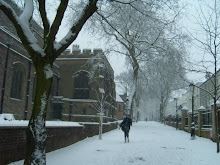
by kb
A couple of years ago my son, who's keen on the radical tradition in music, asked me about Woody Guthrie's attitude to racism. He'd just heard "This land is our land" for the first time and wondered how inclusive that "our" was. Will Kaufman's talk, which included his performance of numerous lesser-known Woody Guthrie songs, answered that question.
Guthrie grew up without questioning white Oklahoma's attitudes to race. His father rode out with the Ku Klux Klan and young Woody was taught to shove Afican-Americans off the sidewalks if they got in his way. We were shown in painful detail what racism meant when the lynching of a mother and her 13-year-old son was described in a little-known Woody Guthrie song "Don't Kill My Baby and My Son." As Will Kaufman sang and played a projection behind him showed the postcard that was made to commemorate the event. Two corpses swung from the Canadian Bridge while above a crowd of white people gazed out. The enlargement of the postcard meant that I could detect, to the left of the crowd, two women or girls in what looked like their best dresses.
Woody's journey from unthinking racist to passionate campaigner against the Jim Crow laws that enforced segregation was filled with appalling incident. How, I wondered, could American segregationists see themselves as the champions of freedom in Europe while treating their neighbours as sub-human? Woody's songs condemning the violence of racism and celebrating resistance were themselves cause for hope - they showed that human beings can change themselves and that hatred and prejudice can be overcome.
As for Will Kaufman's performance - he showed himself a fine singer and guitar-player and an excellent interpreter of Woody Guthrie's freedom songs.


No comments:
Post a Comment